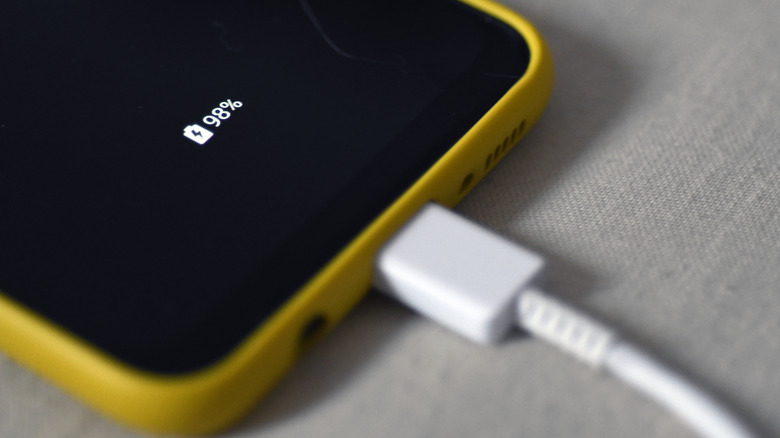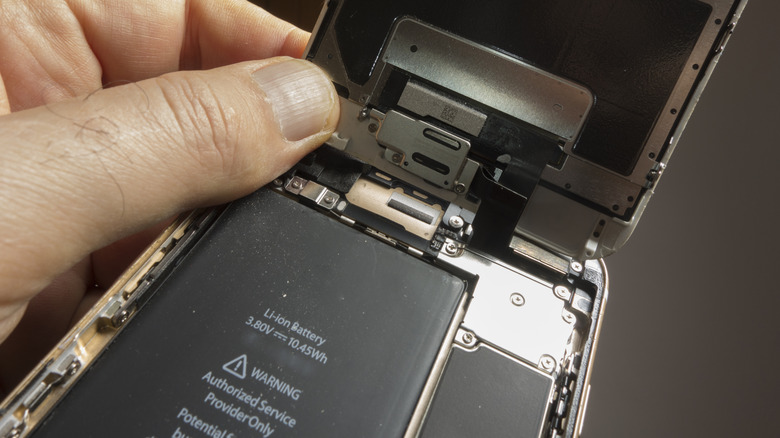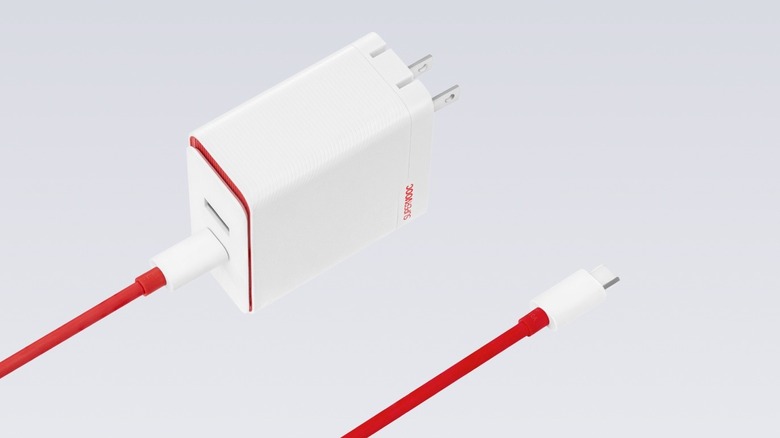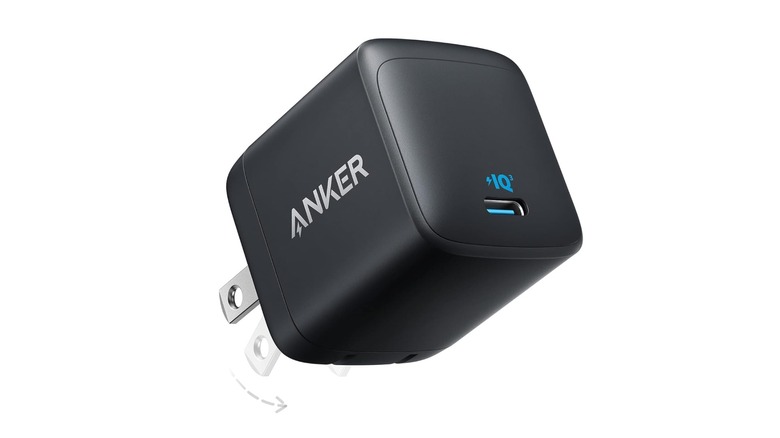Do More Expensive Smartphone Chargers Actually Make A Difference?
We may receive a commission on purchases made from links.
If you're shopping around for a smartphone charger, you may have noticed the wide range of prices. On the low end, charging bricks can cost a few bucks, but the most premium ones can also soar up to a hundred dollars or more. It's easy to assume that this is pure corporate greed. After all, aren't all phone chargers basically the same? Although a high-quality charger is a great way to maximize battery life on your devices, the answer is slightly more nuanced than a one-to-one correlation between dollars invested in a charger and your phone's battery health.
To really understand how price is correlated with quality when it comes to smartphone chargers, we'll need to break down some of the details regarding how phone chargers and battery technology work. The short answer, however, is that not all chargers are created equal. Generally speaking, more expensive chargers are better for your phone's battery health, and may also charge it faster. However, that doesn't mean you should sort your search results by decreasing price and pick the most expensive option. There is a sweet spot where the vast majority of people can get a great charger for their iPhone or Android phone, and it's a lower price than you may think. So, let's dive into the reasons why you might need to upgrade from a bargain bin charger if you want to protect your phone's battery and your peace of mind.
How smartphone batteries and chargers work
First, let's think about how smartphone batteries and chargers work. A majority of smartphones in people's pockets today use lithium-ion batteries. (Silicon-carbon batteries are now emerging, which promise greater energy density, but they have only made their way into a few smartphones as of this writing.) To heavily simplify things, lithium-ion batteries have two "chambers," called the cathode and anode. They are separated by a layer of electrolyte. When you use your phone, lithium ions move from the anode to the cathode, while electrons pass through the phone to power it. In a charge cycle, the process is somewhat reversed. The lithium ions are pushed back through the battery to reset it for further use.
The reason the quality of your charger is important is that the rate of charge matters greatly. Imagine your drained battery connected to a charger like a hungry person eating a meal. If they eat too much food too quickly, they could get sick. Similarly, a charger that tries to push too much electricity into the battery is essentially force-feeding it, which can cause problems ranging from an overall shortening of the battery's lifespan to a thermal runaway that causes severe overheating and can potentially lead to an explosion or fire. High quality chargers are able to meet your battery at the level of power delivery that's best for it, whereas low quality chargers often are not.
Why some expensive chargers can make a difference
The reason you might pay slightly more for a good charger is simple: good chargers feature technology that treats your phone well, and that costs money to implement. For instance, many chargers include USB Power Delivery (USB-PD). It's a technology that creates a digital handshake between the charger and the phone, allowing the phone to tell the charger how much power it can take and how fast. This prevents your smartphone from overheating, and keeps the battery healthy. Some of the fastest charging phones may require their own proprietary technology to enable the blazing fast charge speeds we now see from Asian manufacturers. A good example of this is Oppo's SuperVOOC, a technology that charges the company's phones at speeds more than twice as fast as anything on the American market, but which requires proprietary chargers to work.
In general, cheapness is not necessarily a red flag. The real warning signs to look out for are generic, mass produced "white labeled" chargers sold by nameless or obscure brands — you know, the ones that clog up Amazon listings with names made from random combinations of letters. Because such products are made for the express purpose of undercutting the competition on price in a market where products are already reasonable, they are often victim to corner-cutting during the design and manufacturing process. As a result, they often lack safety features and standard technologies like PD that can help prevent them from ruining your devices. So, in other words, not all cheap chargers are bad, but most bad chargers are cheap.
Why more expensive chargers might not matter
At the end of the day, you should pick the fastest charger for your phone. But, if you live in the United States, it's unlikely you need a particularly fancy charger. While manufacturers like Xiaomi, Oppo, and others have market penetration globally, producing phones that support ridiculously fast charging speeds and other bleeding edge features, we aren't so lucky stateside. The North American market is dominated by the near total duopoly of Apple and Samsung, with the former commanding an average of 55.5% of all smartphone shipments in the United States for all four quarters of 2024 and the latter taking 24% of the same range. This is to say that the vast majority of Americans do not have smartphones that would benefit from some of the most high-spec chargers you can buy.
Apple is coy about its battery tech, but tests from ChargerLab indicate that iPhone users on Apple's top of the line iPhone 16 Pro Max won't benefit from a charger that goes beyond 35W. iPhone customers should actually avoid the main iPhone charger Apple sells, which carries a measly 20W. Meanwhile, Samsung's premium Galaxy S25 Ultra remains capped at 45W. Both Apple and Samsung owners should be more than satisfied with something like the new Anker Nano, a 45 Watt, USB-C Charger Block, which has a list price of $34 on Amazon. Knockoff chargers that can be dangerous to your phone may cost only a dollar or two, so the Anker is only expensive by comparison. Not only will it deliver all the power those phones can handle, but it does so more efficiently than Apple or Samsung's chargers while being significantly smaller thanks to gallium nitride (GaN) technology.



